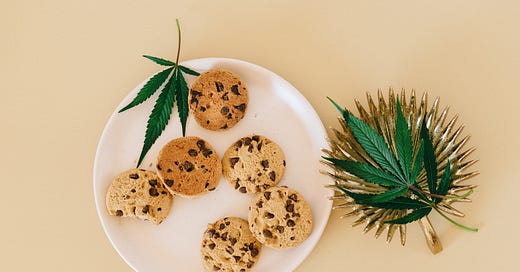How long do edibles take to activate?
If you're curious about the world of cannabis edibles and how they work, you're not alone – as more and more people turn to edibles as a discreet and convenient way to consume cannabis, it's important
Cannabis edibles have become an increasingly popular way to consume marijuana, offering a discreet and convenient alternative to smoking or vaping. However, unlike these traditional methods of consumption, the effects of edibles are not always immediately felt. In fact, it can take anywhere from 30 minutes to two hours for edibles to take effect, leaving many users wondering how long they should wait before consuming more.
In this article, we will explore the factors that determine how long it takes for edibles to activate, the science behind the delayed onset of effects, and tips for safely and effectively consuming cannabis-infused treats.
Why do edibles take longer to kick in than smoking?
The reason why edibles take longer to kick in than smoking is due to the way they are processed by the body. When you smoke cannabis, the active compounds, including THC and CBD, enter the bloodstream almost immediately and reach the brain within seconds, leading to a rapid onset of effects. However, when you consume cannabis through edibles, the active compounds must first be digested and metabolized by the liver before they can enter the bloodstream and take effect.
During digestion, THC and other cannabinoids are converted into a more potent form called 11-hydroxy-THC, which is able to cross the blood-brain barrier more easily and has a longer-lasting effect. This conversion process takes time, and can vary depending on a number of factors, such as the type and potency of the edible, your individual metabolism, and whether you have eaten recently.
Because of this delay in onset, many inexperienced users make the mistake of consuming more edibles before the effects have fully set in, leading to a potentially uncomfortable and overwhelming experience. It's important to start with a low dose, be patient, and wait for the effects to fully take hold before consuming more.
Factors that impact how long edibles take to work
Several factors can impact how long it takes for edibles to take effect, including:
Dosage: The amount of THC in the edible will impact how long it takes to take effect. Generally, higher doses take longer to metabolize and enter the bloodstream.
Metabolism: Every person's metabolism is different, which can impact how long it takes for edibles to take effect. If you have a faster metabolism, you may feel the effects of edibles more quickly.
Body weight: THC is stored in fat cells, so people with higher body fat percentages may feel the effects of edibles more slowly, since it takes longer for THC to be metabolized and enter the bloodstream.
Food intake: Eating edibles on an empty stomach may result in quicker onset of effects, while eating a meal beforehand may slow down the process. Consuming fatty foods along with the edible may also slow down the absorption process.
Tolerance: Regular cannabis users may have built up a tolerance to the effects of THC, which may result in slower onset of effects.
Type of edible: The type of edible can also impact how long it takes to take effect. For example, edibles that are absorbed through the mucous membranes in the mouth (such as lozenges or tinctures) may take effect more quickly than edibles that are digested in the stomach (such as brownies or gummies).
It's important to keep these factors in mind when consuming edibles, as they can impact the timing and intensity of the effects. It's also recommended to start with a low dose and wait for the effects to take hold before consuming more, to avoid any unwanted side effects.
How to make edibles work faster
There are a few strategies that can help edibles take effect more quickly:
Choose the right type of edible: Edibles that are absorbed through the mucous membranes in the mouth (such as lozenges, tinctures, or dissolvable strips) can take effect more quickly than edibles that are digested in the stomach. Consider using these types of products if you want a faster onset of effects.
Try sublingual administration: Placing a few drops of a cannabis tincture or oil under your tongue and holding it there for a minute or two can help the THC absorb directly into your bloodstream, bypassing the digestive system and resulting in a faster onset of effects.
Eat edibles on an empty stomach: Consuming edibles on an empty stomach can result in quicker onset of effects. However, keep in mind that this can also increase the intensity of the effects, so it's important to start with a low dose.
Take a walk or do some exercise: Light exercise, such as going for a walk or doing some stretching, can help increase blood flow and metabolism, which may result in a quicker onset of effects.
Use a THC enhancer: Some products, such as lecithin or mango, are thought to enhance the effects of THC and may result in a faster onset of effects. However, more research is needed to determine the efficacy of these products.
It's important to note that while these strategies may help edibles take effect more quickly, they can also increase the intensity of the effects, so it's important to start with a low dose and be mindful of your consumption. Additionally, it's always best to wait until the effects have fully taken hold before consuming more, to avoid any unwanted side effects.
More resources
Leafly: "Edibles: Everything You Need to Know"
Project CBD: "Cannabis Edibles: A Beginner's Guide"
Americans for Safe Access: "Medical Cannabis Edibles"
The National Academies of Sciences, Engineering, and Medicine: "The Health Effects of Cannabis and Cannabinoids: The Current State of Evidence and Recommendations for Research"
Journal of Analytical Toxicology: "Cannabinoid Pharmacokinetics: The Role of Absorption, Distribution, Metabolism, and Excretion"




